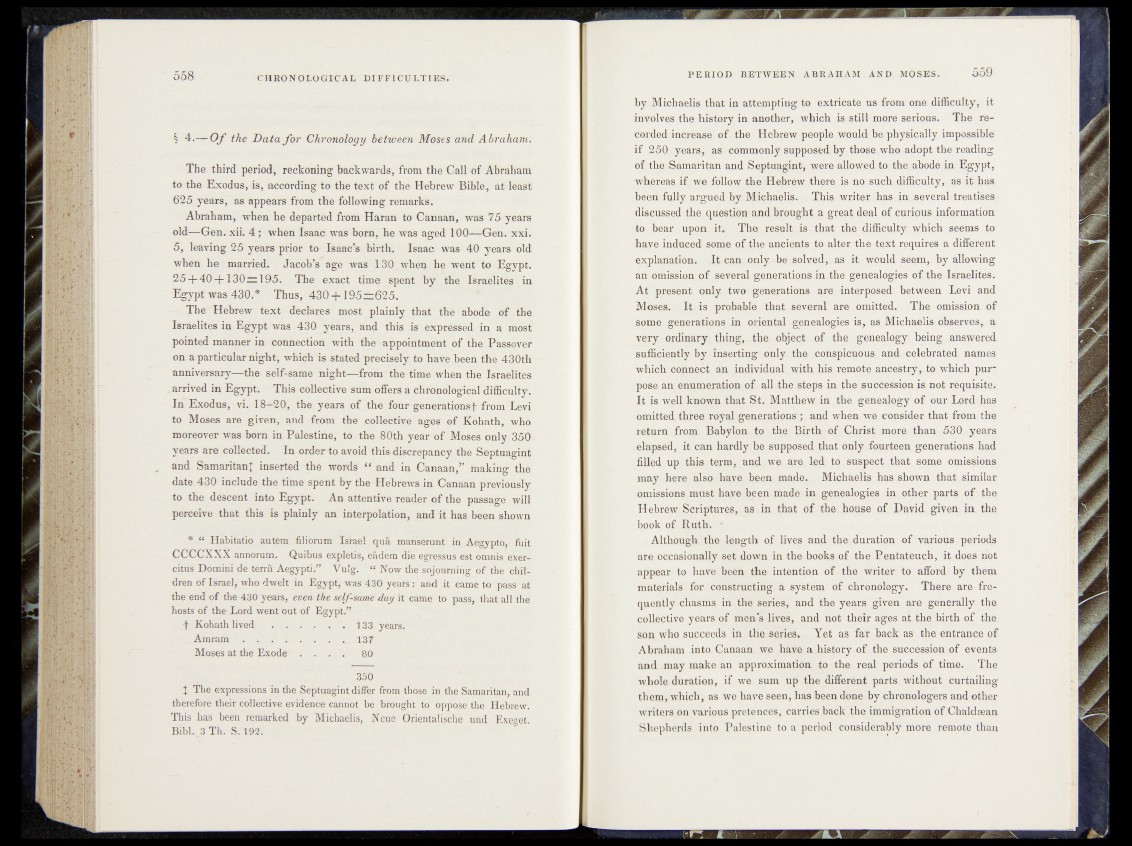
I 4 .— O f the Data fo r Chronology between Moses and Abraham
The third period, reckoning backwards, from the Call of Abraham
to the Exodus, is, according to the text of the Hebrew Bible, at least
625 years, as appears from the following remarks.
Abraham, when he departed from Haran to Canaan, was 75 years
old—Gen. xii. 4 ; when Isaac was born, he was aged 100—Gen. xxi.
5, leaving 25' years prior to Isaac’s birth. Isaac was 40 years old:
when he married. JacobV age was 130 when,he went to Egypt.
2 5+ 4 0 + 130=195. The exact time spent by the Israelites in
Egypt was 430+ Thus, 430 + 195=625»
Jii‘ The Hebrew text declares most plainly that the abode of the
Israelites in Egypt was 430 years, and this is expressed in a most
pointed manner in connection with the appointment of the Passover
oa a particular night, which is stated precisely to have been thé 430th
anniversary—the self-same night—fronr the time when the Israelites
arrived in Egypt. This collective sum offers a chronological difficulty.
In Exodus, vi. 18-20, the years of the four generations-^ from Levi
to Moses are given, and from the collective ages of Kohath, who
moreover was born in Palestine, to the 80th year of Moses only 353
years are collected. In order to avoid this discrepancy the Septuagint
and SamaritanJ inserted the words “ and in Canaan,” making the
date 430 include the time spent by the Hebrews in Canaan previously,
to the descent into Egypt. An attentive reader of the passage will
perceive that this is plainly an interpolation, and it has been, shown
* “ Habitatio autem filiorum Israel qu& mansemnt in.,Aegyptó, fuit
OCCCXXX annorum. Quibus expletis,. eftdem die egressus est omnis "exer-
caths Domini de t e n k Aegyptif’" Vuig'. u Now the sojourning of the children
of Israel, who dwelt in Egypt, was 430 years: and it came to pass at
the end of the 430 years, e v e n th e self-sam e d a y it came to pass, that all the
hosts of the Lord went out of Egypt.”
■f Kohath lived , .
Amram . . . .
Mosès at the Exode
133 years.
137
80
350
X The expressions in the Septuagint differ from those in the Samaritan, and
therefore their collective evidence cannot be brought to oppose the Hebrew.
This has been remarked by Michaelis, Neue Orientalische und Exeget.
Bibi. 3 Th. S. 192.
by -.Michaelift that in attempting to extricate us from one difficulty, it
involves the history in another, which is still more serious. The recorded
increase of the Hebrew people would be physically impossible
if 25.0 years, as commonly supposed by those tvbo adopt the reading
of the Samaritan and Septuagint, were-allowed to the abode in Egypt,
whereas if_ we follow the Hebrew there is no such difficulty, as it has
been fully argued by Michael is. , This writer has in several treatises
discussed the question and brought a great deal of curious information
to bear upon it* Tho result is that tl).e difficulty which seems to
have induced sorpe of the ancients to alter the text requires a different
explanation. It can only be solved, as it would seem, by allowing
an omission -of several generations in the genealogies of the Israelites.
At present only two generations are interposed between Levi and
Moses. It is probable that several are omitted. The omission of
some generations in oriental genealogies is,.as Mjchaelis observes, a
very-ordinary thing,- the. object., of the genealogy being answered,
sufficiently by/inserting only the conspicuous and, celebrated names
which, connect an individual with his remote ancestry, to which pur-
pose an enumeration of all the steps in the succession is not requisite.
It is well known that St. Matthew in tho genealogy of our Lord has
omitted, three royal generations.; and when we consider that from the
return from Babylon to the Birth o£« Christ more than ’53,0 years
elapsed, it can hardly be supposed that only fourteen, generations ,h,ad
filled up this term, and we are led to suspect that some omissions
may here "also have been. made. Michaelis has shown that similar
omissions must have been made in genealogies in other parts of the
Hebrew Scriptures, as in that of the house of David given in the
book of Ruth. '
Although the length of lives and the duration of various periods
are occasionally set down in the books of the,Pentateuch, it does not
appear to have been the intention of the writer to afford by them
materials for constructing a system of chronology. There are frequently
chasms in the series, and the years given are generally the
collective years of men’s lives, and not their ages at the birth of the.
son who succeeds in the series. Yet as far back as the entrance of
Abraham into Canaan we have a .history of the succession of events
and may make an approximation to the real periods of time. The
whole duration, if we sum up the different parts without curtailing
them, which, as we have seen, has been done by cbronologers and other
writers on various pretences, carries back the immigration of Chaldaean
Shepherds into Palestine to a period considerably more remote than